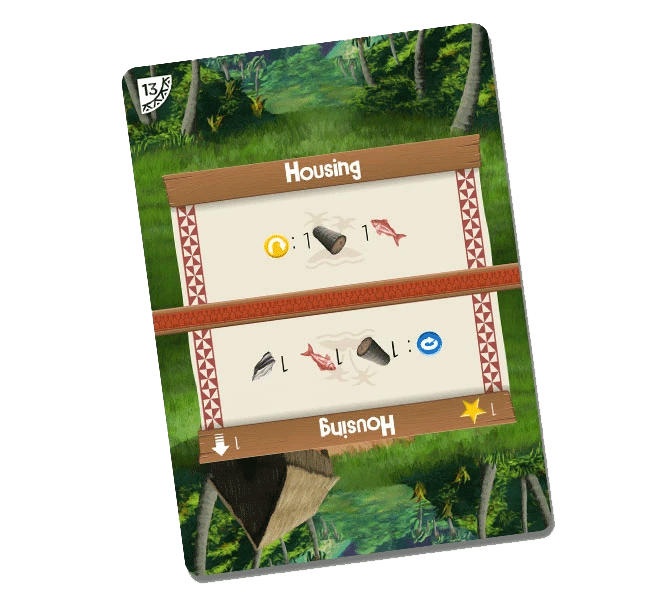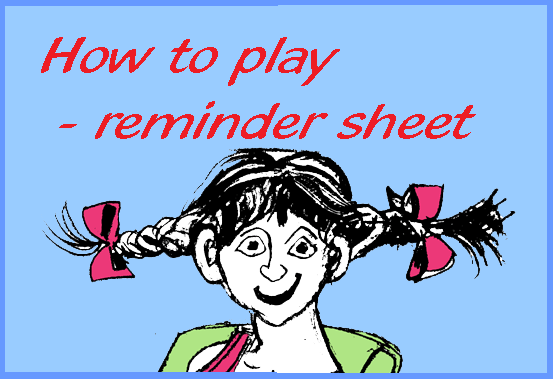
Excellent solo (or duo) game (English)
Palm Island fits with ease into the palm of your hand, so you’ll be able to play it anywhere ~ even on the beach, keeping it safely stored in its rainproof plastic wallet.
This is England ~ it always rains when I go to the beach 🤣
The core game is made up of just seventeen cards, cleverly designed to launch the player into the quest to reveal conditions that may help the island to grow and thrive. The pinnacle of success is measured by development stars, which canbe gained via such as enhanced housing and bright temples.
But it doesn’t come easy. You’ll occasionally struggle to decide just when to save resources as potential for later purchases, and just when to spend them in order to build the biggest pile of gold stars.
The rules aren’t actually hard or complex, but it probably will take a couple of games or so to work out how to play, and most especially how to employ a strategy. To begin with, you might even feel that things happen almost at random, and there’s nothing you can do to control them – but that’s not the case.
Of course, luck is bound to be involved, but players’ decisions matter enormously.
In the rules, “discard” means put the card at the back of the deck: you don’t actually ‘discard’ it.

Each of the seventeen cards (one of which is a turn-counter) represents a feature to be found on Palm Island, such as Quarry, Trade House, and Housing.
Each side of the card has both an upper and a lower section, and each section shows you a small number of options you can take for your next action. Being double sided, each card has four states or positions.
Clearly then, there will be many choices and pathways towards improving the island.
Above each of the four ‘action’ areas, each card has a thick brown ‘title’ bar: such as “Canoe House” or “Logger”. Within that brown bar there also may be (a) a numbered star (for scoring) and (b) a numbered upward arrow ↑, which is an indication of how much that feature has been upgraded.
The Market, Canoe House, and Trade House never bring you any scoring stars, but like all features, they can be upgraded (as shown on the upward facing arrow) with a rotation or a flip, and these upgrades bring you more powerful purchasing ability, even if they bring no scoring stars.
To help make decisions, you’re allowed to look the top three cards, including their reverse sides, though you can only take actions involving the top two.
Yes, I checked with the designer on that one .. 😃
In each game, the earlier rounds might seem to be going nowhere in particular, but they’re helping to set up the later rounds for bigger benefits, hopefully revealing even more gold stars.
If you do so well in a solo game that it’s noteworthy, you may achieve a feat card, which can stay with you for all your future solo games, and add to your potency as an island-improver.
And there’s more!
If you want to expand the game, you can add in a small handful of villagers.
These are shuffled into one’s pack, and when they make their appearance, they can bring substantial changes to the way things are going.
They change the adventures and their outcomes.
And there’s even MORE more!
Designer Jon Mietling has made the game viable for two players.
A duo can play either cooperatively, or competitively. In both cases, they each have a deck of seventeen cards (two packs are included of course).
When cooperating, using their card decks separately, players try to fend off the effects of an eruption, or a famine, or a hurricane. Their efforts may be facilitated (optional) by enhanced abilities in things like shipping or rebuilding.
When competing, their card decks are sorted into identical order, and they work through their individual decks separately, each trying to achieve the greatest “build” efficiency.
Not only can a duo compete, but the game’s set up so that can do so in either a somewhat “casual” fashion, or more practised players can go full out into battle with each other.
A game to challenge and (perhaps) to satisfy ☺
- minimal setup time
- it really is an island in the palm of your hand – take it wherever you go
- some luck, as in all games where one’s trying to build up a thing of strength – islands included
- replayable because it’s never the same game twice
- can be quietly exciting … and annoying !
- with a second set, you can play with more than two !

